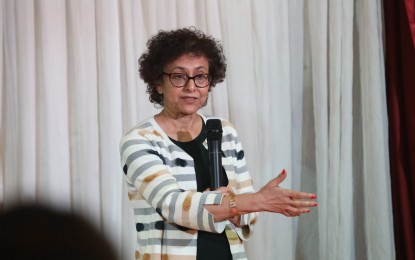
United Nations Special Rapporteur (UNSR) on freedom of opinion and expression Irene Khan (PNA photo by Avito Dalan)
MANILA – Irene Khan, the United Nations Special Rapporteur (UNSR) on freedom of expression and opinion, is a woman of many "firsts."
In July 2020, this Bangladeshi lawyer and human rights advocate made history when she became the first woman ever to hold the position of Special Rapporteur since the establishment of the mandate in 1993 by the UN Human Rights Council (formerly the UN Commission on Human Rights).
Her title, however, came with a tall order: as an independent expert, she is to monitor, advise, and publicly report on human rights situations in specific countries and human rights violations worldwide.
Part of her mandate is to assess and act on cases of reported violations, uphold human rights standards, engage in advocacy, and promote awareness of these critical issues.
But this University of Manchester and Harvard-educated lawyer is no stranger to taking on groundbreaking tasks in the field of human rights.
Before her stint as a special rapporteur, she was the first woman elected as Director-General of the International Development Law Organization (IDLO), the only global intergovernmental organization devoted exclusively to advancing the rule of law and sustainable development.
Under her leadership, from 2012–2019, she became a staunch advocate for women's access to justice.
Speaking at the International Day for the Elimination of Violence Against Women in November 2019, Khan called out how unresponsive institutions and discriminatory laws silence women's voices against sexual abuse.
"As Director General of the IDLO, I see it as our mission to expand access to women's justice to ensure that in this day and age, women have equal political and economic power, without which we can never root out the cause of gender-based violence," she said.
As early as 2001, Khan proved to be a formidable force against human rights abuses when she became the first woman to head Amnesty International.
As the Secretary-General of a worldwide movement focused on human rights until 2009, she trailblazed its first global campaign to stop violence against women and girls, leading to the expansion of the organization's mandate to include economic, social, and cultural rights apart from its work on political and civil rights.
For her advocacy and impactful work, she received the Sydney Peace Prize in 2006.
Her co-authored book, “The Unheard Truth: Poverty and Human Rights," translated into seven languages, further cemented her reputation as an icon for human rights, gender equality, and social justice on the international stage.
From her humble beginnings as the UN High Commissioner for Refugees in the 1980s to becoming the UNSR on freedom of expression and opinion, Khan is a living testament to the power of one's advocacy to create ripples of change.
Khan arrived in the Philippines on Monday for a 10-day visit to assess the government's human rights mechanism, particularly on the freedom of opinion and expression.
As a legal luminary with an extensive media background, having collaborated with the Columbia Global Freedom of Expression program and worked as a consulting editor of The Daily Star, Bangladesh’s largest English newspaper, her meeting with government officials, civil society, and other stakeholders to "examine the situation of the rights to freedom of opinion and expression in the country" presents a great opportunity for the country to assess its changes and challenges as well as problems and prospects in its quest to uphold press freedom and free expression.
After all, as Khan enshrined in her report to the Human Rights Council in 2022, "a free, independent, and diverse media fulfills society’s right to know, as well as journalists’ right to seek, receive, and impart information."
Role of Special Rapporteur
The Special Rapporteurs are part of what is known as the Special Procedures of the Human Rights Council, according to the website of the Office of the High Commissioner of the United Nations Human Rights (UN-OHCHR).
Special Procedures, the largest body of independent experts in the UN Human Rights system, is the general name of the Council’s independent fact-finding and monitoring mechanisms that address either specific country situations or thematic issues in all parts of the world.
Special Procedures’ experts work voluntarily; they are not UN staff and are not paid for their work. They are independent from any government or organization and serve in their individual capacity.
Special rapporteurs can only visit countries that have agreed to invite them.
Ms. Khan's visit to the Philippines is upon the invitation of the government, according to the Department of Foreign Affairs (DFA) in a press statement on Saturday.
"This visit is an opportunity for the Special Rapporteur to appreciate the well-rooted and flourishing democracy of the Philippines, as the oldest democratic Republic in Asia, as seen in the vibrant media landscape and civic space," the DFA statement added.
The Special Rapporteur will present her report to the UN Human Rights Council in June 2025, according to a press release of the UN-OHCHR on Jan. 18, 2024. (PNA)
